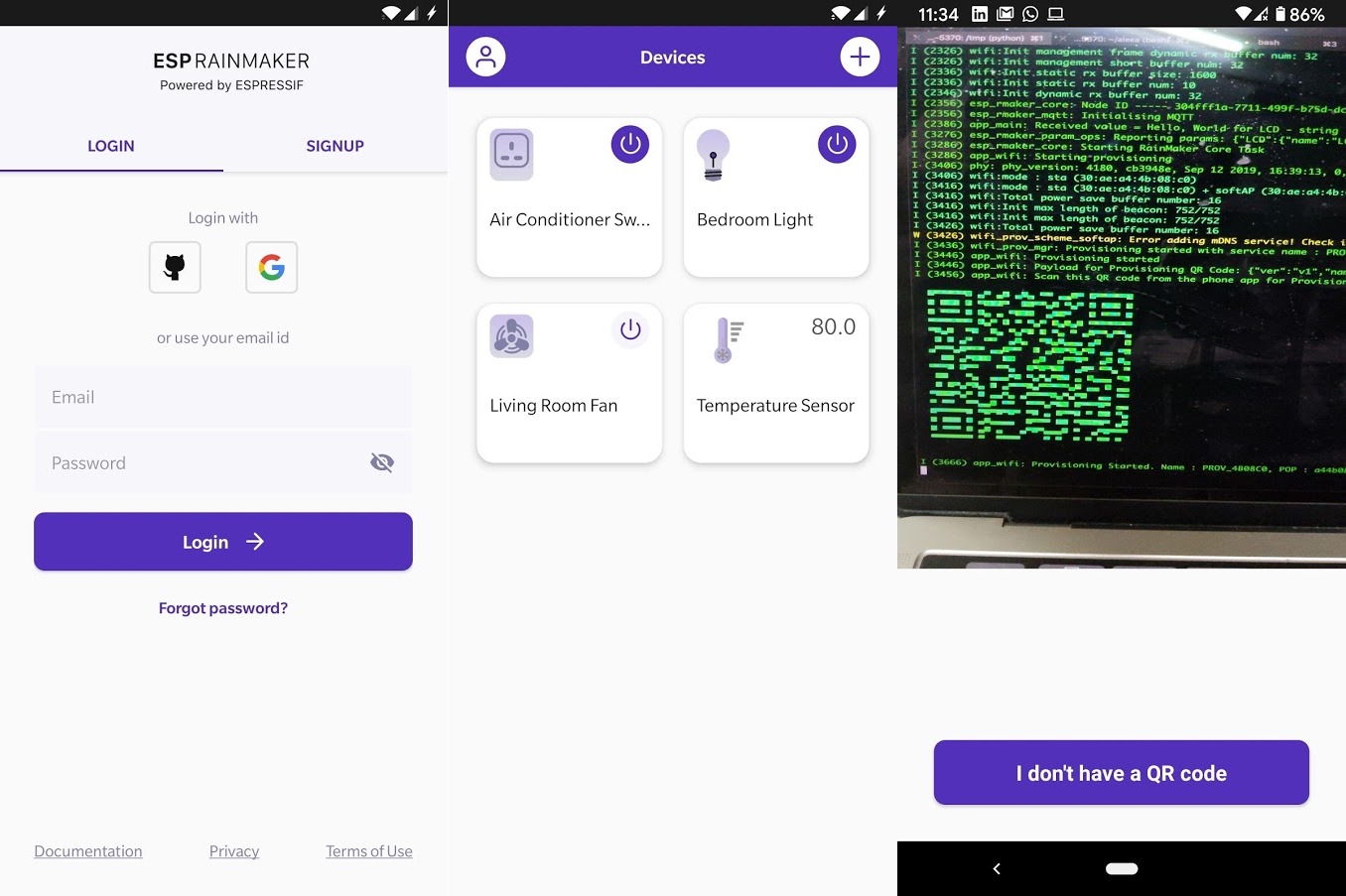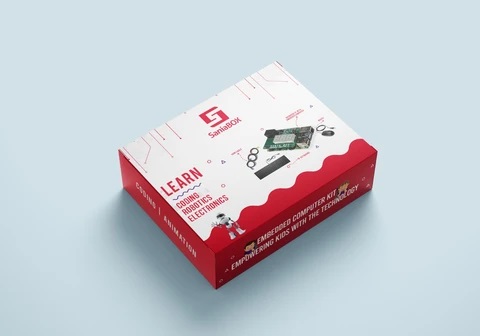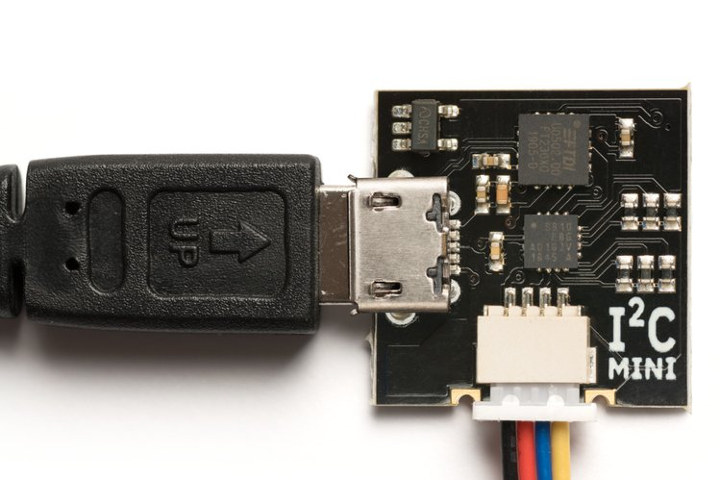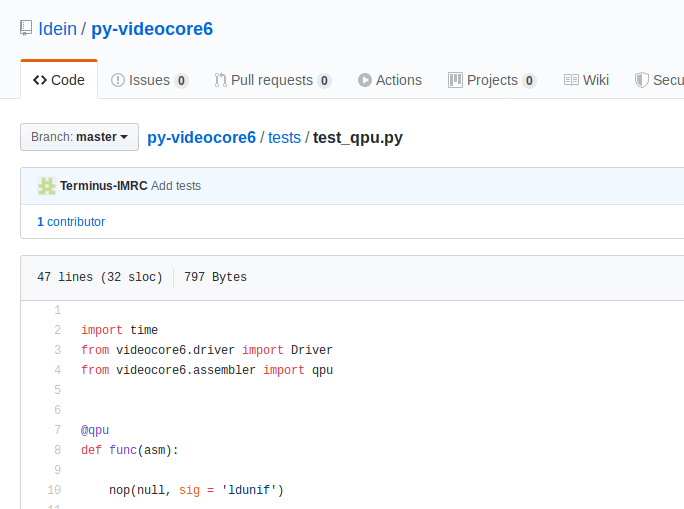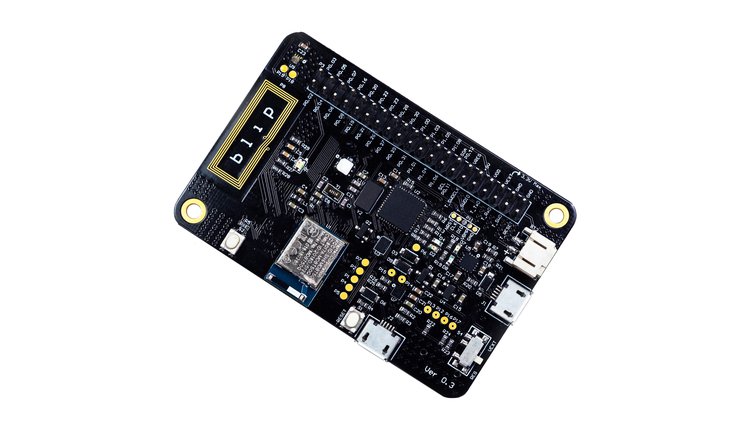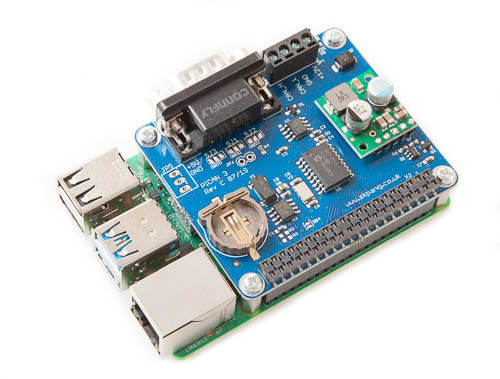Espressif Systems is well-known for its low-cost, well-supported WiFI and Bluetooth SoC for IoT products and projects. But in recent years, the company has also come up with application-specific development boards and corresponding software frameworks to help customer develop their own. Those boards include ESP32-LyraTD-MSC for smart audio applications, or for ESP32-S2-Kaluga-1 multimedia applications using display and camera. The company is now offering another solution to help makers integrate ESP32-S2 secure WiSoC with the cloud and create a mobile app. Meet ESP RainMaker. Specifically, ESP RainMaker provides four main components:: Device Agent SDK to perform network provisioning, OTA updates and facilitate communication with the cloud. Based on the ESP-IDF SDK. Amazon’s AWS powered Transparent Cloud Middleware makes the device’s attributes accessible to the user’s phone applications or other third-party services via RESTful APIs. iOS/Android phone apps to configure and manage the connected device. The apps are “self-adapting”, meaning they can […]
Sania Box Raspberry Pi 4 based DIY Kit is Designed for STEM Education (Crowdfunding)
Sania Box, A Special Kind of DIY RPi4 Based Kit The 13-year-old Sania Jain is a young entrepreneur, published writer and tech aficionado who now offers an embedded computer kit called Sania Box. The Raspberry Pi 4 based embedded system kit comes with an add-on board and has been designed to develop coding skills in anyone 8 years old or more, and for learning IoT, STEM, and for all kinds of DIY fun. Background Some DIY RPi-based kits can be found in our archives, such as the Piper Computer Kit 2 made for children’s education, but there’s now another option thanks to Sania Jain who has been designing, building, and writing in the STEM arena for some time. Sania Jain’s accomplishments are amazing, and look to be just her beginning in STEM-based endeavors. A Concept With Wide Reach The Sania Box was conceived by Sania Jain and built by Moonshot […]
MarsCat is a Bionic Cat Powered by Raspberry Pi 3 (Crowdfunding)
Elephant Robotics MarsCat is a robotic cat that tries to mimic the behavior of actual cats through artificial intelligence. It can have a life of its own roaming the house, and you can also interact with it as it will play with toys/teasers through its camera, and you can send voice command to ask it to walk, run, look at you, be quiet. etc… but the trick is that it may not always obey like a real cat, and its personality will evolve depending on how you interact with it. Beside being a bionic pet, MarsCat can also be used to teach/learn robotics as the company will release an open-source SDK allowing you to change the Python code running on the Raspberry Pi 3 board powering the cat, and access API’s to control the camera, microphone, touch sensors, as well as the 16 servos connected to a Microchip ATMega2560 MCU […]
Raspberry Pi 4 Powered Open Source Hardware Robot Paves the Way for Robot Maids
Eventually, we all expect robots to do chores and other manual tasks performed by humans such as preparing and serving food at restaurants, carry objects over rough terrain as opposed to just inside the warehouse with a flat floor, or even moves pieces on a chessboard when other humans are no here to play with us. I’m fully expecting to eventually own a robot maid of sorts to wash dishes, mop the floors, and perform other tasks on my behalf. We are not there yet, but Raspberry Pi 4 powered Pollen Robotics’ Reachy open source-hardware robot is getting us closer to the goal as it can handle small objects and via two robotic arms and a dual-camera head, and can also interact with humans using a microphone and a speaker. Key features and specifications of Reachy robot: Main body SBC – Raspberry Pi 4 SBC with 2GB according to a […]
I2CMini is tiny USB to I2C Bridge for your PC or SBC (Crowdfunding)
Last year, we wrote about Excamera Labs SPIDriver tool to control and monitor SPI devices from your computer, but this year the company launched another similar product for I2C: I2CDriver. Both debugging tools show signals and information on a small display, but if all you want to do os to control I2C devices from your computer or isolated from an SBC, Excamera Labs has now come up with the tiny I2CMini USB to I2C bridge board. I2CMini key features & specifications: Fast transfer – sustained I²C transfers at 400 and 100 kHz I²C pullups – programmable I²C pullup resistors, with automatic tuning Dual I²C ports – a castellated 0.1″ header, plus a Qwiic standard connector Jumpers – Color-coded Sparkfun Qwiic jumper included for instant connection 3.3 V output: output levels are 3.3 V, all are 5 V tolerant Supports all I²C features – 7- and 10-bit I²C addressing, clock stretching, […]
py-videocore6 Raspberry Pi 4 GPGPU Python Library Leverages VideoCore 6 GPU
Raspberry Pi 4 SBC was released at the end of June with a new Broadcom BCM2711B SoC that also includes VideoCore 6 (VC6) GPU for 2D and 3D graphics, and that could also be used for general-purpose GPU computing (GPGPU). In the past we’ve seen companies such as Idein leveraged VideoCore 4 GPGPU capabilities in Raspberry Pi 3 / Zero to accelerate image recognition, and they released a python library (py-videocore) for that purpose. The problem is that the VideoCore 6 GPU found in RPi 4 is quite different than the VideoCore 4 GPU in earlier versions of the Raspberry Pi Foundation board as forum member phiren explains: I’ve been looking though the open source drivers and here are some of my observations: vc6 is clearly derived from vc4, but it is significantly different. vc6 is only a slight extension over vc5 The QPU pipeline stays mostly the same, you […]
Blip Nordic nRF52840 Dev Board Includes STM32 Black Magic Probe Programmer & Debugger (Crowdfunding)
The Latest Electronut Labs Nordic nRF52840 Based Dev Board Electronut Labs has started its Crowd Supply campaign for Blip, a Nordic nRF52840 based development board. With many onboard sensors and systems, the boards are aimed at prototyping and projects in a wide variety of BLE and 802.15.4, wireless application scenarios. It has a programmer and debugger built-in. Past Articles Electronut Labs has a series of Nordic Semiconductor SoC projects previously reported on including Papyr, a Bluetooth E-Paper Display and Bluey, a BLE Development board using the Nordic nRF52832, and CNXSoft also published an article comparing several of the Nordic SoC available in development boards for Bluetooth 5 (BLE5). The Features the Stand Out Blip has a Black magic Probe compatible programmer and debugger built-in, along with a temperature/humidity sensor, ambient light intensity sensor, and a three-axis accelerometer. The board is designed to prototype very low power devices and an ability […]
PiCAN3 Board for the Raspberry Pi 4 adds CAN Capabilities plus a Real-Time Clock
Copperhill Technologies has recently announced the release of its PiCAN3 CAN-Bus Board for the Raspberry Pi 4. The PiCAN3 adds Controller Area Network capabilities plus a real-time clock to the new Raspberry Pi SBC. The Controller Area Network (CAN Bus) is a robust and common industrial communication bus used mostly in the automotive industry. CAN supports long travel distance, medium communication speed, and quite reliable. One of the most significant advantage with CAN-BUS is that it connects any number of ECUs (or microcontrollers) in your car through the two-wire bus, CAN High and CAN Low, reducing the weight of wires that could be gained by using point-to-point communication between ECUs. CAN bus is one of five protocols used in the on-board diagnostics (c)-II vehicle diagnostics standard. Although it is popular in the automotive industry, the Raspberry Pi doesn’t provide an off the shelf support for working with CAN-BUS. Users interested in trying out […]


